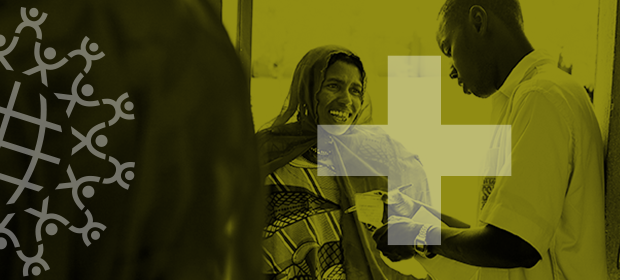Where We Work
See our interactive map


During any three-day, high-level meeting of the global health leaders, some common refrains are inevitable.
But at the meeting I attended in Cape Town, South Africa, last week—the World Health Organization’s high-level meeting dubbed “Building Health Security Beyond Ebola”—one refrain seemed to reverberate louder than you might expect to hear in a conference ballroom, and it mostly came from West African country representatives.
At the heart of global heath security lie three pretty simple notions: detect, report, and respond.
That refrain: the kind of health security envisioned by the International Health Regulations, Global Health Security Agenda, and the One Health Initiative, cannot be realized without more focus on developing a stronger frontline health workforce where access to health services, disease surveillance, and health systems are the weakest.
At the heart of global heath security lie three pretty simple notions: detect, report, and respond; all three very much needing local health workers trained, equipped to be the first line of defense against myriad potential infectious disease threats.
Given that the current Ebola epidemic in West Africa and many other major infectious disease outbreaks in recent decades started in rural areas with very little access to health workers, it’s not surprising human resources (aka health workers) would be at the top of the priority list for West African countries in their recovery plans.
In fact, they’ve been saying it for a long time—Guinea at a major WHO forum in November 2013 called attention to the lack of health workers in the exact province where the outbreak started, less than one month before patient zero of the epidemic was believed to be infected.
At least 400 million people on this planet do not have access to essential health services.
Yet, as I noted at this meeting, despite some great success stories, we have not seen the kind of progress in addressing the most severe gaps in the world’s frontline health workforce than we have in a host of other issues, especially on the African continent where this meeting was held.
A WHO and World Bank report out last month, in fact, found at least 400 million people on this planet do not have access to essential health services. This estimate is directly tied to another report published just three months ago by the International Labour Organization, which said 10.3 million more health workers needed today to provide essential services to all, and 7 million of that deficit comes from rural areas.
Nowhere has felt the devastating consequences of a thin frontline health workforce more than Guinea, Liberia, and Sierra Leone.
The compounded devastating effect of the loss of more than 500 health workers in the three countries was modeled in the Lancet this week by David Evans. He and colleagues found the loss of these health workers could lead to the loss of more than 4,000 women to childbirth who would not otherwise have died—more new mothers dying who otherwise wouldn’t have than people who died in the September 11, 2001, terror attacks.
I have yet to hear anyone—including the participants of “Building Health Security Beyond Ebola”—disagree with the notion that it’s imperative to strengthen the global frontline health workforce. Yet, in the draft outcomes document from this meeting there wasn’t an explicit mention of the workforce despite its centrality during the discussion.
To make progress in the coming decades, it must be much higher on the priority investments for global health initiatives across the board—from the burgeoning Global Health Security Agenda discussed here this week, to the Every Woman, Every Child Campaign, to the global strategies to curb HIV/AIDS, tuberculosis, and malaria.
These efforts should be guided by a robust WHO global strategy for the health workforce—a zero draft of this strategy is out for public comment until Aug. 31, so please join the Frontline Health Workers Coalition and other advocates by submitting your feedback to WHO.
The biggest question looming remains in financial support. In Addis Ababa, Ethiopia, on Friday, African finance and health ministers issued a call to “[s]ubstantially increase domestic financing for recruitment, development, training, and retention of the health workforce”—including a focus on community-level workers. Increased domestic investments must be coupled with targeted and increased investments from donors.
The delegates in Cape Town rightly stated that we cannot yet move “beyond Ebola”—as frontline health workers continue to fight to end the epidemic in West Africa.
The global development community must show equal dedication to supporting their efforts and to ensuring that we have the frontline health workforce that can detect, report, and respond far swifter to the next threat comes our way.
This post originally appeared on the Frontline Health Workers Coalition blog.
Get the latest updates from the blog and eNews




